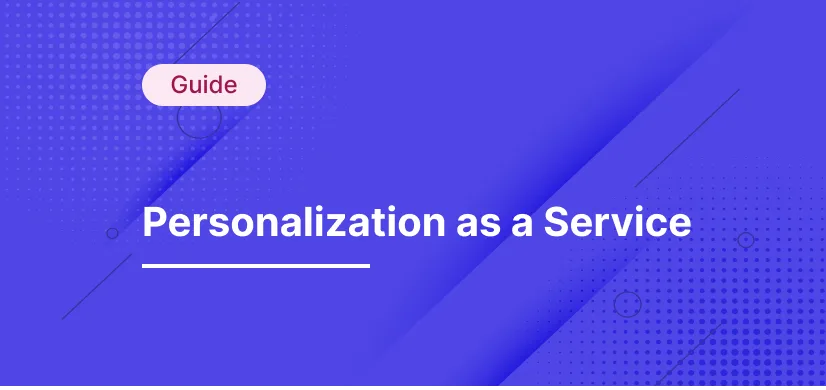- Personalization
PaaS: Everything You Need to Know About Personalization as a Service


After a personalized shopping experience with a brand, 60% of shoppers think they will become repeat buyers.
Therefore,
Offering a personalized experience for your customers is the best way to ensure that they feel valued and appreciated - and will come back for more.
As a business, you know that personalization is key to customer satisfaction and loyalty.
Moreover,
According to Google, 90% of multiple device owners switch between screens to complete tasks, using an average of three different combinations every day.
It’s easy to say that customers want to be able to move effortlessly from one channel to another without having to repeat themselves or start from scratch.
To sum up, customers want:
personalized experiences
connected, omnichannel journeys
If you don’t have enough resources to build omnichannel personalization experiences in-house, one of the best ways to achieve this is by using personalization as a service. Personalization as a Service (PaaS) is very similar to the SaaS model that allows businesses to tailor their interactions with customers by collecting and incorporating data about them into their marketing and sales efforts regardless of the channel.
But, more specifically, what is personalization as a service, and how can you make sure that you're using it to its full potential, what are the benefits?
In this blog post, we'll discuss everything you need to know about personalization as a service. We'll outline what it is, how it works, and why it's so important for today's businesses.
What Is Personalization as a Service
Since customers are switching between an average of three different channels and demanding tailored experiences from brands, the solution to deliver high-level continuous and consistent customer experiences is straightforward: personalized omnichannel experiences.
As a business, you need to make sure your customers are getting personalized messages, recommendations, and offerings on every channel. The customers should be able to see what they're looking for and expect it from any source, whether that's a website, an email, or a mobile app.
This is where personalization as a service comes into play:
Personalization as a service is a cloud-based software architecture model that integrates content and customer data from multiple sources and provides personalization across all channels.
In other words, personalization as a service is a software licensing model which allows access to software on a subscription basis using external servers that enable a way to provide personalized content and experiences to customers without the need for them to manually input their preferences. It relies on the use of customer data to algorithmically personalize content in real-time. This can be used to personalize everything from product recommendations to dynamically generated web pages.
Although personalization as a service has been around for several years, it has only recently gained traction due to advances in DXP space, MACH architecture, artificial intelligence, and machine learning.
The Benefits of Personalization as a Service
Since personalization as a service tools are cloud-based (and usually API-first), they can be integrated with existing systems and technologies, making them an ideal choice for businesses looking for a comprehensive personalization solution.
Personalization as a service allows you to benefit from composable architecture.
Let’s recall the definition:
“Personalization as a service is a cloud-based software architecture model that integrates content and customer data from multiple sources and provides personalization across all channels.”
In a composable architecture, the different parts of the system are connected in such a way that new functions can be created by combining existing ones.
This allows for more flexibility and faster reaction to changing business needs.
Since personalization as a service leverages cloud-based, composable software architecture, it allows businesses to fully benefit from composable architecture.
Personalization as a service supports omnichannel personalization.
Omnichannel strategies are becoming increasingly popular among businesses as they look to provide a consistent customer experience, regardless of the device or platform being used.
But delivering an effective omnichannel strategy can be tricky, especially if your personalization solution isn't equipped for it.
That's where personalization as a service comes in.
Since personalization as a service is a composable software architecture model that integrates content and customer data from multiple sources, it makes it easier to manage and deliver content across different channels.
Personalization as a Service vs. Personalized (Customer) Service
Although personalization as a service and personalized service are two different concepts, there is still confusion about the two. So, let’s take a look at what personalized service is.
What Is Personalized Service
Personalized service is a type of customer service tailored to the customer's individual needs. This can include everything from customizing a product to fit the customer's personal preferences to provide them with unique, one-on-one assistance that is based on their specific situation.
By personalizing the service experience, businesses are able to create a more memorable and enjoyable experience for the customer, which can lead to repeat business and loyal customers.
Personalized service can be contrasted with mass production and mass marketing, which provide standardized products and services that are identical for all customers. While mass production and mass marketing can be efficient and cost-effective, they do not provide the same level of customization and personalization as personalized service.
As a result, personalized service can be seen as a way to differentiate oneself from one's competitors.
Why Is Personalized Service Is Important
By definition, personalization is the process of tailoring products, services, and experiences to fit the individual needs and preferences of a customer.
Personalization has become even more important in today's competitive landscape as companies strive to create unique and differentiated experiences for their customers.
Whether it’s a personal thank-you note for a recent purchase or a birthday discount sent via email, personalization can make all the difference when it comes to customer service.
There are many benefits of personalized services. First and foremost, personalization creates a more positive customer experience, which can lead to greater customer satisfaction and loyalty. In addition, personalization can help to increase sales and conversion rates by making the customer feel valued and appreciated - more likely to continue doing business with the company.
In a world where businesses are striving to stand out from the competition, personalization is a powerful tool that can give businesses the edge they need to succeed.
How Do You Personalize a Service
Delivering personalized service has become increasingly important in recent years, as customers have come to expect a more tailored and individualized experience.
In short, personalized service means giving each customer the attention they deserve and meeting their unique needs.
There are a number of ways to personalize service, depending on the business and the customer base. For example, some businesses may choose to make use of customer data to personalize communication and service delivery. Other businesses may focus on creating a more personal relationship with each customer, such as by building a rapport and getting to know customers on a personal level.
Personalized service involves creating a system where the customer feels valued and heard.
The key is to find the right mix of personalization techniques that work for the business and the customers.
You can read ‘7 Effective Ways of Website Content Personalization to Create Compelling Customer Experiences’ to see personalization examples to level up your digital customer experience.
The Bottom Line
In today's hypercompetitive business environment, it's more important than ever to give customers a personalized experience.
In fact, personalization has become one of the most important differentiators for businesses across industries.
Personalization can take many forms, but at its core, it is about understanding the individual needs of each customer and providing them with a tailored experience that meets those needs.
By personalizing the customer experience, businesses are able to create a stronger connection with their customers. This personal connection helps to build trust and loyalty, both of which are essential for long-term success.
Studies have shown that personalization can lower acquisition costs by up to 50%, improve revenues by 5 to 15%, and enhance marketing spend efficiency by 10 to 30%. And customers who have a personalized experience are also more likely to recommend a company to others.
Given the clear advantages of personalization as a service, it's no wonder that businesses are increasingly investing in ways to deliver it.
In short, personalization is a key ingredient in delivering an outstanding customer experience. Without it, businesses will struggle to thrive in today's competitive environment.
Learn how to deliver unique and personalized customer experiences to increase conversions
